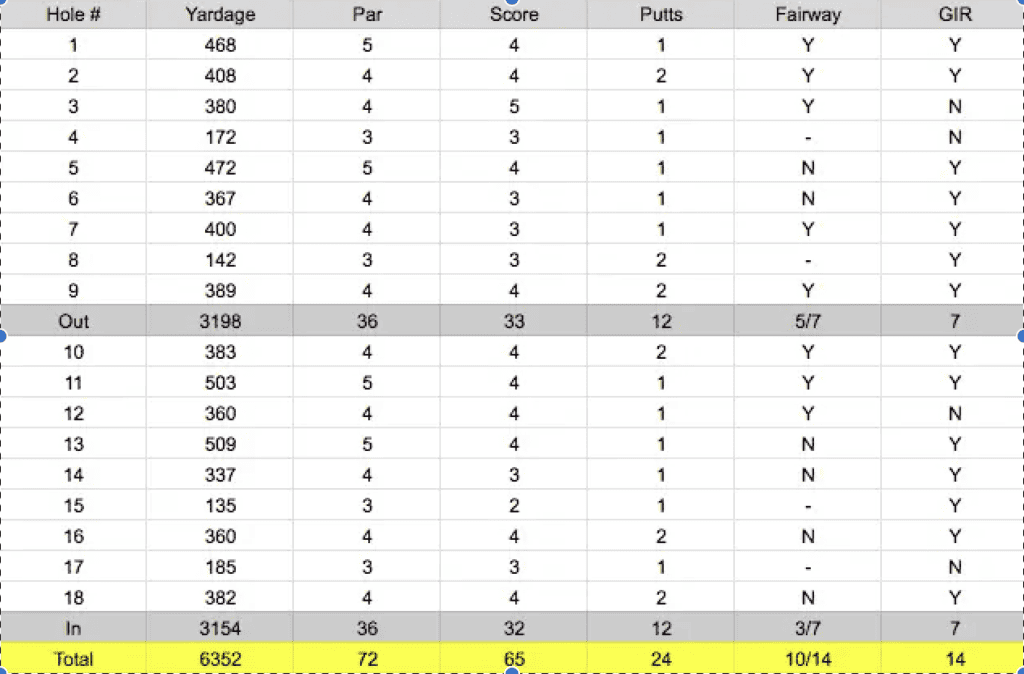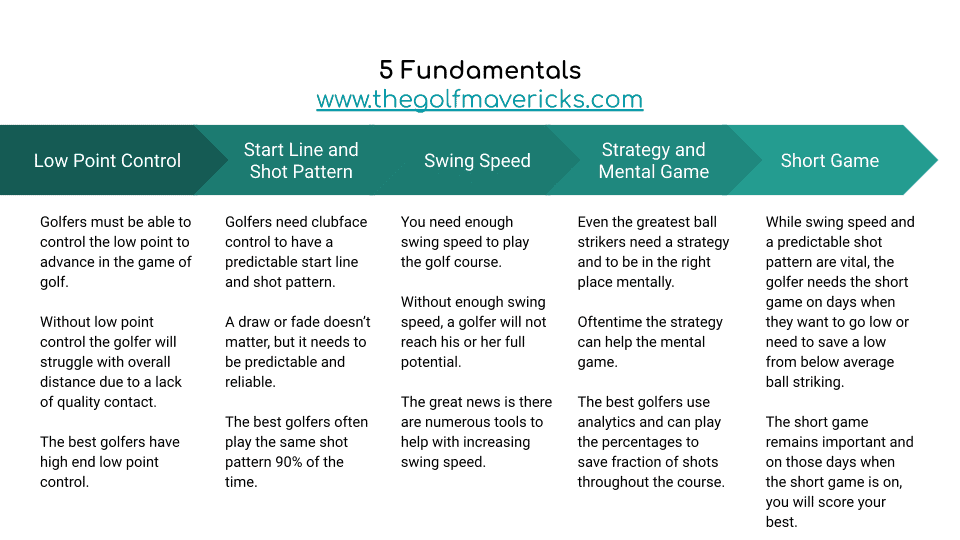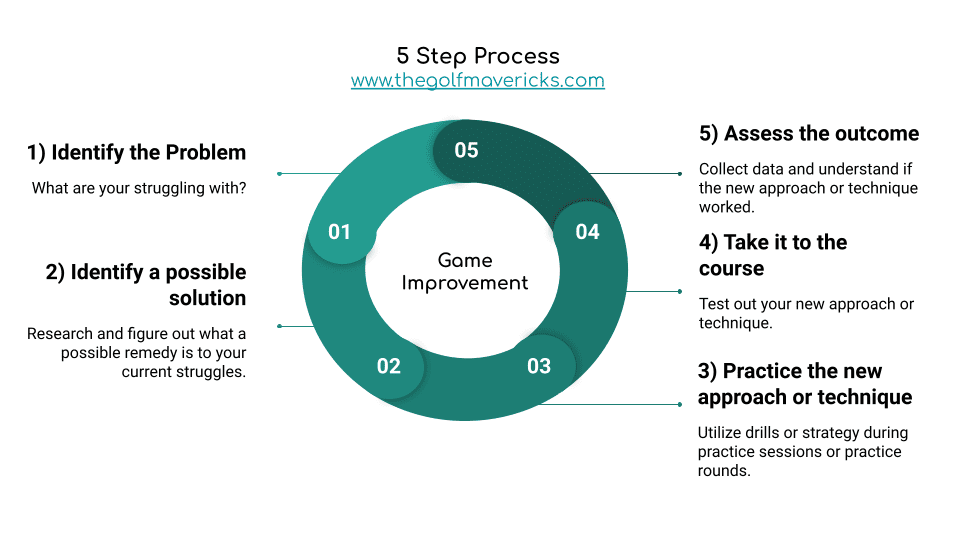
Golf is a sport that has fascinated me for years.
The precision, the strategy, and the sheer skill required to excel at it have always captivated my attention. I have been on a journey since age 10 to try to “master” the game and play consistent, quality golf.
As a beginner, one question that has crossed my mind time and time again is:
How long does it take to get good at golf?
And then started to question how long to break 100 in golf, how long to break 90 in golf, how long to break 80 in golf, how long to break 70 in golf and finally how long to become a scratch golfer.
Fortunately, I have been able to reach these levels and help others accomplish their goals and new levels of achievement.
In this post, we will explore how long it will take to reach different levels in the game of golf and then dive into the different factors that influence the timelines.
After each level, we provide recommendations on areas to focus on for the quickest improvement.
How Long Does It Take To Get Good At Golf?
For most golfers it will take at least 2 years to get good at golf. We consider 80 the benchmark of good golf. During these 2 years, the golfer must commit to regular practice, seeking quality advice and building skill whenever possible. The more athletic the golfer is in combination with access to quality information and a golf course to play and practice at regular the quicker the results will take place.
Helpful Resources
- How To Get Good At Golf: 5 Step Process
- 10 Reasons Why Golfers Don’t Get Better
- How To Hit A Driver Better in Golf – 11 Tips!
- How To Hit Your Irons Better (Pure and Consistent)
- How To Hit Your Wedges Better!
- Get Better at golf by improving your putting
- 11 Tips To Improve Your Chipping
Depending on the level you are currently at, we do have recommendations below to help you get to the next level quicker!
Key Areas to Focus On For Golf Improvement

How Long To Break 100 in Golf?
There will be some golfers that can break 100 in the first several months of playing the game. The more athletic background the golfer has, along with the quality of the hand eye coordination will play a significant role. The overall swing speed plays a vital role at all levels of golf. The reality is if you can’t hit a driver over 180 yards, 100 will be difficult to break on an average length golf course.
Areas To Focus On For Quicker Improvement: Ball striking and keeping the ball in play. The best golfers keep the driver in play and strike the ball solid.
How Long To Break 90 in Golf?
There will be some golfers that can break 90 in the first 6 months. We see the most athletic golfers with the best hand eye coordination who have quality swing speed often break 90 in the first 6 months. The biggest obstacle usually comes down to keeping the ball in play off the tee and making enough putts and quality chips to break 90.
My Experience: I started at age 10 and it took me a couple of years to break 90 due to the inability to hit the ball far enough. Once I broke 90, I quickly got to the next level of breaking 80 much quicker than breaking 90.
Areas To Focus On For Quicker Improvement: If you strike the ball solid enough and hit it over 225, the quickest route to breaking 90 is through the short game. Even if you miss every green in regulation, but can save par 3 out of 18 times, you can break 90.
How Long To Break 80 in Golf?
Most golfers will take at least 2 years with some golfers never achieving this level. It has been reported that only 2% of golfers can break 80. We believe with the right mindset and approach, a higher percentage of golfer can break 80 if they set out to achieve this goal.
Areas To Focus On For Quicker Improvement: I typically see golfers struggle with course management when they reach this level. They hit the ball good enough and while the short game might be inconsistent, they often make poor decision leading to rounds of 82-85 that could have been a 78.
How Long To Break 70 in Golf?
Most golfers will never break 70, no matter how long they golf. According to the USGA, only .92% of golfers can break 70. It takes a certain level of driver swing speed in combination with a strong mental game, quality ball striking and an impressive short game.
My Experience: I first broke 70 at age 17 on my home course. For Greg in our foursome here at thegolfmavericks.com he is in his second year of playing more seriously and is still striving to break 80.
Areas To Focus On For Quicker Improvement: Speed!
Why is swing speed so important?
The more speed the shorter the approach shot. The shorter the approach shot, the closer the proximity to the pin. The closer the proximity to the pin, the more putts you will make. To break 70 you have to hit quality shots and keep the ball in play. Speed can help with all of those areas.
Check out this chart below:
| Handicap Range | Median Driver Distance Average |
| PGA Tour Professional | 275 Carry |
| Scratch | 251 |
| 0-5 | 244.6 |
| 6-10 | 231.3 |
| 11-15 | 220.4 |
| 16-20 | 210.3 |
| 21-25 | 201.9 |
| Total Average of 0-25 | 221 |
How Long To Reach Scratch in Golf?
Most golfers will never play scratch level golf. It could take years to even get closer into the single digit area for handicaps. For those that do reach this level, it will take 5-10 years on average.
Here is a formula to help you compare your stats to a scratch golfer:
| Greens in Regulation | 67% |
| Fairways Hit | 53% |
| Putts Per Hole | 1.67 |
| Scrambling | 54% |
| Sand Saves | 59% |
| Average Driving Distance | 251 |
Source: www.golfjourney365.com
What is the Fastest Way To Get Better At Golf?
The fastest way is to focus on increasing swing speed and improving your short game. The analytics show the importance of overall distance and the ability to save shots around the green. The scratch level golfer averages 251 yards off the tee and can save par 54% of the time in the short game.
Other areas to focus on include:
- Low Point Control (Improves Ball Striking)
- Start Line and Curve (Improves Accuracy)
- Mental and Course Management (Keeps you in the right frame of mind)
How Long Did It Take You To Get Good At Golf?
Once I started playing on a regular basis, it took me 2 years to be able to break 80. It took me one more year to break 70 and to set my all time low of a 65 it took me 25 years. Golf is a journey, but with the right time, plan and dedication, golfers can reach new levels.

Is Golf A Hard Sport To Learn?
Golf can be difficult to learn because of the many components of the game: driving, iron play, wedges, chipping and putting. The technique is difficult from a physical perspective and the mental side of the game can be the most difficult obstacle for many to overcome. Plus, it takes time and in today’s busy world many people lack the time to dedicate to true game improvement.
How Long Does It Take To Get Good at Golf: The learning curve of golf
It’s important to understand the learning curve associated with this sport.
Golf is notorious for its steep learning curve, and many beginners find it challenging to even make contact with the ball at first. However, with consistent effort and practice, progress becomes evident.
At the initial stages, it’s common to struggle with the basics such as grip, stance, and alignment. It may take weeks or even months to develop a comfortable swing and consistently hit the ball straight. As one becomes more proficient, the focus shifts to refining technique, mastering different shots, and improving overall consistency.
The learning curve in golf is never-ending, as even the best players continuously strive for improvement.
We believe when a golfer starts off, they should focus on 5 key fundamentals.
- Low Point Control
- Start Line and Shot Pattern
- Swing Speed
- Strategy and Mental Game
- Short Game
How Long Does It Take To Get Good At Golf: Factors that influence the time
Several factors influence the time it takes to become proficient at golf.
First and foremost, the frequency and quality of practice play a crucial role. Regular practice sessions, preferably with a structured training plan, enable players to develop muscle memory, fine-tune their swing mechanics, and build confidence on the course. Physical fitness, coordination, and flexibility also impact one’s progress in golf.
Another factor to consider is the individual’s commitment and dedication to the sport. Golf requires patience, perseverance, and a willingness to put in the time and effort required for improvement. Those who approach golf with a growth mindset, embracing challenges and learning from mistakes, tend to progress at a faster pace.
The availability of resources such as golf lessons, access to a golf course or driving range, and opportunities for competitive play can significantly influence one’s development in the sport. Taking advantage of these resources can provide valuable guidance, feedback, and exposure to different playing conditions.
Recommendation: Need more distance in your game, check out this post!
How Long Does It Take To Get Good At Golf: Why Practice is Vital
The adage “practice makes perfect” holds true in golf. Consistent and focused practice is essential for improving golf skills. Spending time at the driving range, working on different aspects of the game, and simulating on-course situations can help build muscle memory and develop a reliable swing.
To make the most out of practice sessions, it’s important to have a clear plan and set specific goals. Breaking down the game into different areas, such as driving, iron play, short game, and putting, allows for targeted practice and improvement in specific areas of weakness. Additionally, incorporating drills and training aids can provide structure and enhance skill development.
Check out our 5 step process for game improvement!
Practice should also extend beyond the technical aspects of the game.
Developing a pre-shot routine, honing course management skills, and practicing mental strategies, such as visualization and focus, contribute to overall performance on the course. Balancing technical practice with mental and strategic practice is key to becoming a well-rounded golfer.

How Long Does It Take To Get Good at Golf: Golf lessons and their impact
While practice is essential, seeking guidance from a golf professional through lessons can significantly accelerate skill development. A golf instructor can provide valuable insights, correct swing flaws, and offer personalized feedback tailored to an individual’s specific needs.
During lessons, instructors often use video analysis to identify areas of improvement and compare a player’s swing to that of professionals. This visual feedback can be instrumental in understanding swing mechanics and making necessary adjustments. Additionally, instructors can provide drills and practice routines to address specific weaknesses and enhance overall performance.
It’s important to note that the impact of golf lessons on skill development varies from person to person. Factors such as the individual’s ability to implement feedback, the frequency of lessons, and the amount of practice between lessons all play a role in determining the effectiveness of lessons. However, for most beginners and intermediate players, golf lessons can provide a solid foundation and accelerate progress.
My Experience: I have relied a lot on the online instructors on youtube. I have received swing reviews from Bobby Lopez and Kyle Morris and have learned a great deal from the teaching of Shawn Clement, George Gankas and Milo Lines.
Just getting started, check out this video by Shawn Clement!
How Long Does It Take To Get Good at Golf: Setting realistic expectations
When embarking on the journey of learning golf, it’s crucial to set realistic expectations for progress. Golf is a challenging sport that requires time and effort to master. Understanding that improvement takes time and that setbacks are a natural part of the learning process can help manage expectations and prevent frustration.
Instead of fixating on immediate results, focus on small victories and incremental progress. Celebrate improvements in swing mechanics, consistency, or scoring. Recognize that golf is a lifelong pursuit, and every round, regardless of the score, presents an opportunity to learn and grow.
It’s also important to remember that progress in golf is not linear. Improvement may come in spurts, with periods of stagnation or regression. Embrace these fluctuations as part of the journey and stay committed to the process. By maintaining a positive mindset and being patient with oneself, long-term progress and mastery become attainable goals.
How Long Does It Take To Get Good at Golf: Tips for accelerating the learning process in golf
While golf mastery is a gradual process, there are several tips and strategies that can accelerate the learning curve:
- Invest in quality equipment: Having properly fitted clubs and equipment that suits your swing can make a significant difference in your performance.
- Develop a routine: Establish a consistent pre-shot routine that helps you focus and prepare for each shot. This routine can instill confidence and improve consistency.
- Play with better golfers: Surrounding yourself with more skilled players can challenge you to raise your game and learn from their expertise. Observing their strategies and techniques can inspire growth.
- Practice with purpose: Rather than mindlessly hitting balls at the range, approach each practice session with a specific goal in mind. Whether it’s working on your short game or improving accuracy off the tee, having a clear focus enhances the effectiveness of practice.
- Play different courses: Exposing yourself to different playing conditions and layouts can broaden your golfing experience and develop adaptability. Playing on unfamiliar courses challenges your decision-making skills and helps
- you become a more versatile player.
By implementing these tips, you can optimize your learning process and progress at a faster rate. Remember, improvement in golf is a combination of technical skill, mental fortitude, and experience on the course.
How Long Does It Take To Get Good at Golf: Common mistakes to avoid when learning golf
As with any endeavor, there are common mistakes that beginners make when learning golf. Being aware of these pitfalls can help you avoid unnecessary setbacks and frustrations:
- Neglecting fundamentals: Building a solid foundation is crucial in golf. Neglecting the basics, such as grip, posture, and alignment, can lead to ingrained flaws that are challenging to correct later on. Prioritize learning and mastering the fundamentals from the start.
- Overreliance on power: Many beginners fall into the trap of swinging too hard in an attempt to hit the ball farther. However, power should be generated through proper technique and timing, not sheer force. Focus on developing a smooth and controlled swing rather than
The True Fundamentals of Golf
Conclusion
Golf is a difficult sport, but with the right plan, time and dedication you can reach new levels. Just be realistic in your journey and find someone to help provide feedback and a way to collect data on the round.
Here at thegolfmavericks.com, we all use the Arccos system to give us shot gained statistics to help us narrow our biggest area of needed work.